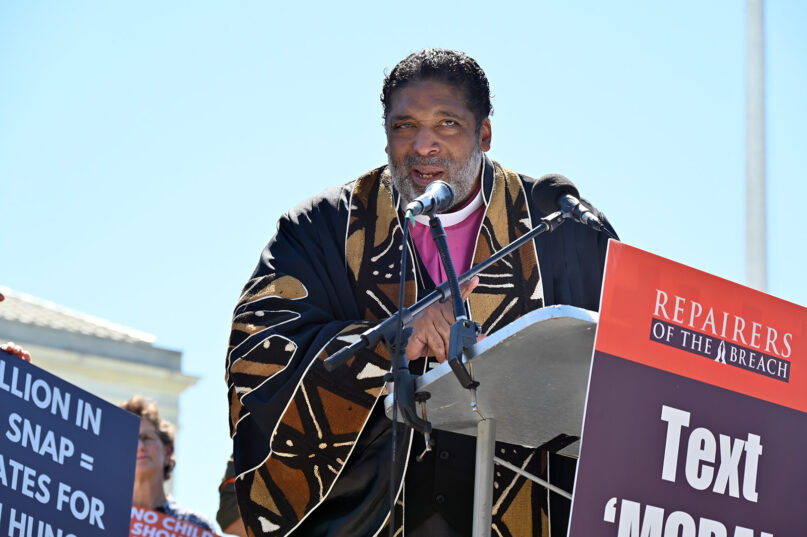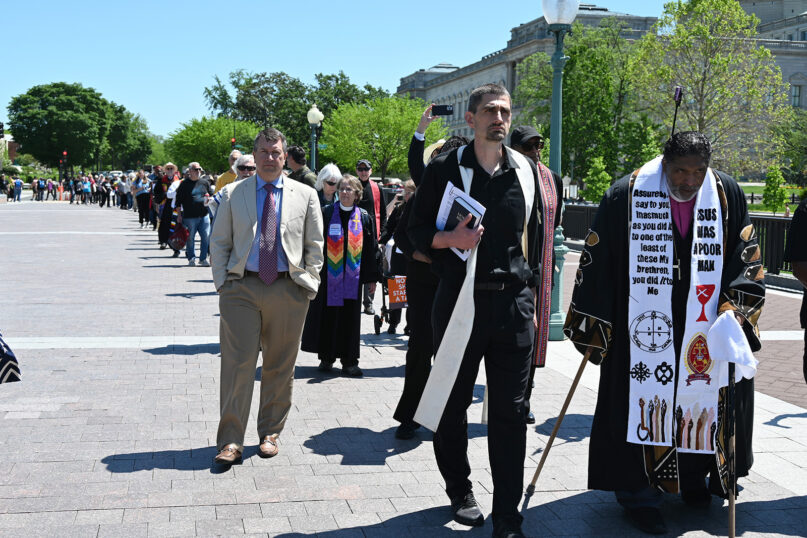WASHINGTON (RNS) — Prominent pastor and anti-poverty activist the Rev. William Barber and two others were arrested while praying in the U.S. Capitol Rotunda on Monday (April 28), an action he said would be part of a recurring series of demonstrations aimed at challenging the Republican-led budget bill.
The arrests occurred roughly 15 minutes after Barber, the Rev. Jonathan Wilson-Hartgrove and Steve Swayne, director of St. Francis Springs Prayer Center, started praying in the Rotunda as dozens of police stood nearby, some prepared with plastic handcuffs. The three took turns praying, lamenting potential budget cuts to social safety-net programs such as Medicaid, often chanting together: “Against the conspiracy of cruelty, we plead the power of your mercy.
“When we cannot depend on the courts and the legislative power of human beings, we can still depend on … the power of your love and your mercy and your truth,” Barber said in the Rotunda as police began to surround him.
While arresting protesters at the Capitol is not unusual, the response to Barber’s prayer was unusually dramatic: After issuing verbal warnings, dozens of officers expelled everyone in the Rotunda — including credentialed press — and shut the doors, obscuring any view. Press and others were then instructed to leave the floor entirely.
Speaking with RNS shortly after he was released from police custody on Monday, Barber, who has a chronic illness that affects his ability to walk, said he was in pain from the prolonged ordeal but that his interactions with police were “cordial.”
Barber — who is founder of the Center for Public Theology and Public Policy at Yale Divinity School, where he also teaches — said he was handcuffed by police and briefly detained. While he found the incident unsettling, he hoped it would draw attention to those who will be impacted by potential budget cuts, he said.

“To think that we went in to pray — pray against the budget, but to pray nonetheless — and the order now is that, evidently, if you pray, you are seen as violating the rules of the Rotunda,” he said. “What we hope is that folks will see this and it will begin to remove some of the fear, and people will understand that this is the time — now — that we must engage in nonviolent direct action to register our discontent.”
Reached for comment, a Capitol police spokesperson said Barber and two others were charged with “crowding, obstructing and incommoding,” explaining demonstrations in congressional buildings are “not allowed in any form, to include but not limited to sitting, kneeling, group praying, singing, chanting, etc.”
The spokesperson also said the Rotunda is “not a dedicated press area unless it’s for a pre-approved event.”
Some quickly argued that Barber’s arrest appeared incongruous with President Donald Trump’s efforts to eliminate “anti-Christian bias” in federal agencies.
“Arresting Rev. Barber and others at the Capitol after announcing a task force to eradicate anti-Christian bias in government is an absolute travesty,” Anthea Butler, a professor of religion at the University of Pennsylvania, said in a text message. “Seems like this administration only wants Christians who are supporters of Trump to have access to pray in the Capitol and express their faith.”

She was echoed by the Rev. Paul Raushenbush, president and CEO of Interfaith Alliance and a critic of the Trump administration.
“The arrest of Bishop Barber feels like the most clear example of hypocrisy of the Trump administration when they talk about anti-Christian bias,” Raushenbush said. “They are not interested in the broad expression of faith as exemplified by Bishop Barber, but rather only Christians approved of by the Trump administration.”
The arrests followed a rally nearby outside the U.S. Supreme Court building, where Barber rallied with other clergy and faith leaders, as well as federal workers who lost their jobs, to condemn the GOP-led budget.
Speakers at the rally, which was organized by Repairers of the Breach, focused specifically on how the budget would impact women and children. Among those who addressed the crowd at the rally or press beforehand were: the Rev. Teresa Hord Owens, general minister and president of the Christian Church (Disciples of Christ); Sheila Katz, CEO of the National Council of Jewish Women; Imam Talib M. Shareef, president and imam of historic Masjid Muhammad, also known as “the Nation’s Mosque”; Marc H. Morial, president and CEO of the National Urban League; and Sarah Anderson with the Institute for Policy Studies.
“Forty-three percent of women and almost half of all children are poor and low income,” Barber told the crowd, citing an assessment of America that appeared to be from the Institute for Policy Studies. “Somebody ought to say something … Somebody gotta challenge this budget.”

Speakers expressed particular concerns about potential cuts to Medicaid, for which some conservatives have advocated. But on Monday, speakers such as Anderson noted a dozen House Republicans recently sent a letter to Speaker Mike Johnson opposing cuts to Medicaid.
“Soften the hearts of representatives, like the 12 who wrote to the speaker today,” Wilson-Hartgrove, an author and activist, said while praying in the Rotunda. “Twelve Republicans asking their speaker to not cut Medicaid. We ask you to move all those hearts, Lord.”
The protest was the beginning of a “Moral Monday” campaign that Barber said he hopes will feature demonstrations every week moving forward. It’s an approach to activism the pastor has used to great effect in the past. Today’s protest was launched on the 12-year anniversary of the original Moral Monday protest movement he organized in North Carolina in 2013, which was credited with helping unseat the governor in that state.
A Repairers of the Breach spokesperson acknowledged in a statement that the three people were arrested in the Rotunda after the rally, while “practicing their First Amendment rights.”
“On this, the first Moral Monday in D.C., faith leaders and impacted people came to the people’s house to demand a moral budget — one that lifts from the bottom, prioritizing poor and low-wage people, women, children and workers,” the statement said.

The police response to the group’s actions on Monday contrasted sharply with another worship service in the same space in March 2023, when far-right musician and activist Sean Feucht led an evening worship service that included participation from lawmakers such as Rep. Lauren Boebert. Unlike Barber’s prayer service, Feucht’s took place in the evening after most people had left the Capitol, and whether or not it was sanctioned is unclear: Feucht has claimed to have “snuck in” to the Rotunda to hold worship on multiple occasions, but Capitol Police declined to specify whether the specific incident was permitted.
However, Feucht’s event was significantly longer than Barber’s brief prayer session, and while police occasionally spoke with participants, no one was arrested.
“We prayed in public today because the cries of the people who will be hurt by this immoral budget must be heard,” Wilson-Hartgrove told RNS in a text message, after he and Swayne were released from police custody. “I’m not sure why some citizens are allowed to pray in the Rotunda and others can’t, but I pray as part of my pastoral responsibilities.”
Asked about the discrepancy, a Capitol Police spokesperson said they were unfamiliar with the Feucht event but said it was likely approved ahead of time, “especially if a member of Congress was involved and if it was after hours when the building was generally closed to the general public.”

Barber, meanwhile, was met by police as he marched toward the Capitol with a group of clergy and others from the Supreme Court. He was eventually allowed into the Rotunda, but only after dozens of officers were positioned outside the entrance to the historic room before he arrived.
Despite the intensity of the response, Barber said he is unmoved and plans to continue demonstrating — and praying — in the weeks to come.
“Just as Jesus turned over the tables of the money changers, so we have to be willing to put our bodies on the line,” he said. “I pray that impacted people will (come) — again, not to go to get arrested, but to arrest the attention of the nation.”
Original Source: